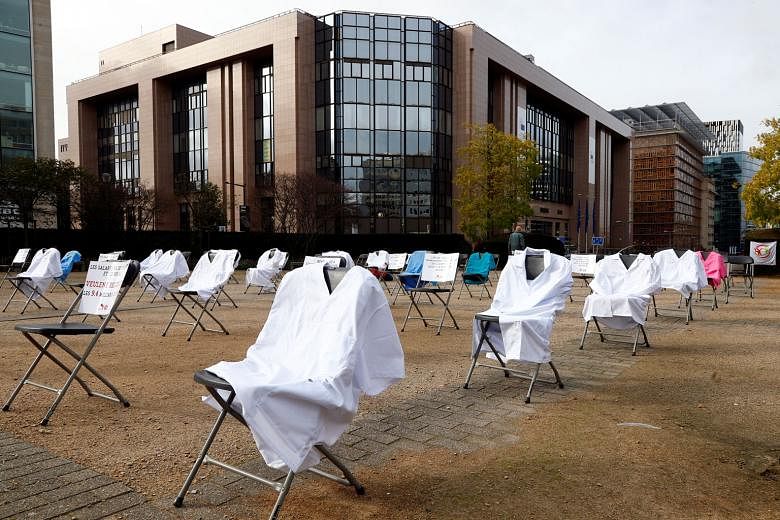PARIS • France and Germany ordered their residents back into lockdown and Britain resisted pressure to follow suit yesterday, as a huge second wave of coronavirus infections threatened to overwhelm Europe before the winter.
Financial markets steadied somewhat yesterday, after a brutal selloff the day before. The prospect of a double-dip recession came ever more clearly into view with the news that two of Europe's biggest economies were imposing nationwide restrictions almost as severe as the ones that drove the global economy this year into its deepest recession in generations.
"The virus is circulating at a speed that not even the most pessimistic forecasts had anticipated," French President Emmanuel Macron said on Wednesday. "We are all in the same position: Overrun by a second wave which we know will be harder, more deadly than the first... We need to return to the lockdown which stopped the virus."
Under the new French measures which take effect today, people must remain at home except when buying essential goods, seeking medical attention or exercising for up to one hour a day. They can go to work if their employer deems it impossible for them to do so at home. Schools will stay open.
Anyone leaving their home in France will now have to carry a document justifying being outside.
Germany will shut bars, restaurants and theatres from Nov 2 to 30 under steps agreed between Chancellor Angela Merkel and heads of regional governments. Schools will stay open and shops can operate, with limits on access.
"We are in a dramatic situation at the start of the cold season. It affects us all, without exception," Dr Merkel told Parliament yesterday. "The winter will be hard."
She said her government had moved quickly to prevent intensive care facilities from being overwhelmed, and that the new restrictions to reduce social contact were "necessary and proportionate".
France has seen a surge of above 36,000 new cases a day. Germany, which was less hard-hit than its European neighbours earlier this year, has seen an exponential rise.
In Britain, a new study by Imperial College in London underlined the dire situation facing the country with the largest number of coronavirus deaths in Europe, showing cases in England doubling every nine days.
The study's author, Professor Steven Riley, said the government should decide quickly if it wanted to follow France and Germany.
"And sooner is better than later for these," the professor of infectious disease dynamics told BBC.
But British Prime Minister Boris Johnson's government continued to resist pressure to impose a second nationwide lockdown.
Housing Minister Robert Jenrick told Times Radio: "The judgment of the government today is that a blanket national lockdown is not appropriate, would do more harm than good."
Britain has opted instead for a tiered system of local controls intended to tighten measures in affected regions while leaving others less restricted.
Switzerland also took the "middle path" in curbs aimed at slowing infections without crippling its economy. It ordered dance clubs closed and added new mask rules while leaving the nation largely open for business.
The government in Bern ordered in-person college classes to be halted from next Monday, placed new limits on sporting and leisure activities, and ordered masks to be worn in packed offices, secondary schools and even outdoors if people cannot keep their distance.
"We have to work with a scalpel and make very precise cuts," Health Minister Alain Berset said on Wednesday, referring to the targeted measures. "If it's not possible to get the virus under control, then other measures are possible. But we're trying to take a middle path."
Public gatherings will now be limited to 50 people, and sporting and cultural activities with more than 15 people will be banned. Bars and restaurants must close at 11pm, while private family gatherings will be capped at 10 people.
Switzerland, which in June appeared to have had the virus contained, saw new cases soaring to 8,616 on Wednesday - accounting for 0.1 per cent of its population - in a single day.
While leaders have been desperate to avoid the crippling cost of lockdowns, the new restrictions in Europe reflect alarm at the galloping pace of the pandemic.
The latest surge in new cases has put Europe back at the centre of the pandemic, which has seen more than 44 million infections and 1.1 million deaths worldwide.
The region this week accounted for almost half of all new global infections in the previous seven days.
The United States has also seen a surge in new Covid-19 cases, with more than 80,000 new cases and 1,000 deaths on Wednesday.
By contrast, many Asian countries have begun to relax restrictions as the disease is gradually brought under control.
REUTERS











